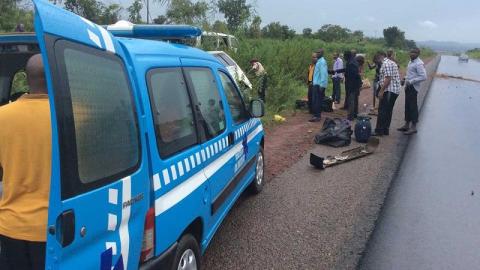
The Federal Road Safety Corps (FRSC) has disclosed that no fewer than 63 lives were lost in last week’s Sallah holidays celebrated across the country.

The Federal Road Safety Corps (FRSC) has disclosed that no fewer than 63 lives were lost in last week’s Sallah holidays celebrated across the country.
Also, 1,072 persons were involved in road traffic crashes during the period with 213 vehicles, involved compared to 221 in 2017, while 79 lives were lost in the previous year.
A statement by Bisi Kazeem, the Corps Public Education Officer, noted that a total of 201 animals were also involved in crashes in 2018, as against two in 2017.
He gave the breakdown of vehicles involved in road traffic crashes across the nation as follows: 18 tanker/trailers; 21 trucks; 37 buses; 89 cars; 29 motorcycles; 10 tricycles; nine pickups, and 201 animals.
He also stated that a total of four crashes claimed at least four lives during the period. The crashes occurred in Kantagora on August 20, 2018, claiming 11 lives; another occurred in Wudil on the same day claiming seven lives; five lives were lost in Aba on August 21, 2018, and eight persons also died in a crash that occurred in Toro, Bauchi State on August 21, 2018.
According to him, the corps arrested 4,983 offenders for 6,097 offences committed across 2,360 routes covered by the corps in the country, during the last Eid-El-Kabir celebration, while the most prevalent offence recorded during the period was seatbelt use violation, with 1,540 offenders arrested.
He added that a number of mobile court sittings were conducted across the country during the period in which total of 102 persons were arraigned. The figure was, however, a reduction compared to 2017.
In the previous year, Kazeem said the corps made 218 arrests. He, however, said 99 of the latest offenders were convicted, compared to 208 in 2017, while three persons were discharged and acquitted.
In the same vein, the corps recorded a significant increase in the number of people rescued without injury during the 2018 Sallah special patrol operations, while a total of 612 persons were rescued without injury as against 552 persons in the same period in 2017, representing 10.87 per cent increase. He attributed the increase to improved patrol operations.
FRSC rescued 397 persons with injuries in road traffic crashes during the 2018 Sallah celebration, compared to 400 in the previous year. Of the total number of 118 crashes, 63 were fatal, compared to 79 in 2017; 61 were serious, compared to 83 in 2017, and a total of 26 were minor crashes compared to 22 in 2017.
The statement quoted the Boboye Oyeyemi, the FRSC Corps Marshal, as saying that the corps now has a wider coverage due to the establishment of more commands, outposts, road-side clinics and zebra points, that now feed in reports from different routes, that were hitherto not thoroughly covered.
He stressed that the increase in number of road crashes, persons involved, and number of persons killed is due to the reports that emanated from the new FRSC formations.
The corps marshal had earlier directed the 2018 Sallah special patrol to cover 45 corridors which include but were not limited to Sokoto-Tambuwal-Jega-Birnin Kebbi; Mokwa-Birnin Yero-Zaria; Maiduguri-Biu-Numan-Jalingo-Wukari; Akwanga-Lafiya-Makurdi; Jos-Bauchi-Gombe; Katsina-Kano-Wudil-Dutse-Azare-Potiskum, Kaduna-Saminaka-Jos, and Abuja-Kaduna-Kano.
In view of Corps Marshal’s directives on the need to ensure comprehensive surveillance and patrol of the stated corridors including the alternative routes, which is a move away from previous years where focus was on critical corridors, he noted that FRSC had intensified its patrol operations and enlightenment campaigns by giving adequate coverage to all the 45 routes identified across Nigeria.
Further to this, enlightenment through motor park rallies increased by 32.5 per cent, radio programmes increased by 40 per cent, while television programmes increased by 63 per cent within the period.
Kazeem maintained that the positive changes in the reduction of offences and offenders, impoundments, and arraignments was attributable to increase in public enlightenment, enforcement, traffic control, cooperation from stakeholders and the fully automated process of obtaining drivers licence, which he said ensured that motorists are trained in driving schools before they were qualified to apply for their licences.